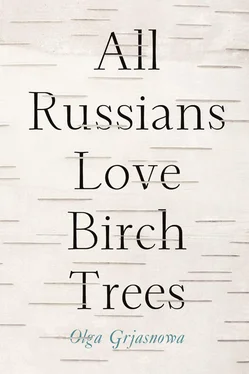Olga Grjasnowa
All Russians Love Birch Trees
Vershinin: Why should you care? Here there’s such a wholesome, bracing Russian climate. A forest, a river … and birch trees here too. Dear, humble birches, I love them more than any other tree. It’s a good place to live. Only it’s odd, the train station is over thirteen miles away … And nobody knows why that is.
Anton Chekhov, Three Sisters
I didn’t want this day to begin. I would rather have stayed in bed and kept sleeping, but the laughter of the fruit vendor and the rattle of the streetcar invaded our bedroom through the wide-open window. Our apartment wasn’t far from the central station, which basically meant that in our neighborhood there were streets better left avoided, with discount stores and huge erotic cinemas. Here — between an old Chinese Laundromat and a left-leaning youth center, whose visitors often mistook our front door for a urinal — was our home. Our apartment was ramshackle and rundown, but cheap. Every morning at about five o’clock, fathers, brothers, and cousins unloaded their vans beneath our windows. They slammed their doors and assembled their stands, drank tea, roasted corn on the cob, and waited. They waited for the street to fill so that they could advertise their fruit in automated singsong voices. I tried to follow their conversations, but mostly just understood a bit here and there, or fell asleep again.
Elias was lying next to me: stirring, lips slightly parted, eyelids fluttering, irregular rise and fall of his chest. “Fucking pig faggot, I’ll kill you!” yelled a drunk under our window. The fruit vendors laughed at him and spit sunflower shells onto the street.
Elias woke up and turned toward me. Without opening his eyes, he rested his head on my stomach. His hands followed mine. We stayed there, wedged together, until someone else’s alarm clock went off behind the wall and my hand grew numb beneath his weight. When it went completely numb I climbed out of bed to take a shower.
The kitchen was crammed with yesterday’s dishes. Pots and pans with crusty rims, plates and half-full wineglasses were stacked on top of each other on the counter. The air smelled like exhaust and stuck to my skin like syrup. It was going to be the hottest day of the year.
Elias was sitting at the kitchen table. In his right hand was a spoon full of granola. Crumbs were scattered in front of him. Half a roll sat on a plate, covered in a dark red layer of jam. I took a seat facing him, reached for the newspaper, and then, instead of the paper, studied his face. He had high cheekbones, gray-blue eyes, and dark lashes just a little on the short side. Elias was little-boy-pretty. His good looks annoyed him — people would never remember him as a person, but as someone resembling an actor, whose name they never quite remembered. It wasn’t his beauty, but rather his intuitive politeness that gave him the effect he had — on impatient cash register ladies, who suddenly forgot to check their watches, on giggling schoolgirls, medical assistants, librarians, and me. First and foremost on me. The gifts of a con man, my mother said. But she loved him, because of those gifts especially, and because Elias, for whatever reason, knew how to behave around an Eastern family.
He poured coffee into his granola. White dissolving into brown and raisins bobbing on the surface. On the kitchen table, under the newspaper, lay an open cookbook. On the page a fish’s head stared out at me questioningly. I flipped it shut.
“I hate to remind you, you’re a vegetarian!” I said jokingly.
“At least I check what it is that I’m putting into the oven,” he replied, irritated.
He was alluding to the night before. I had attempted to make a quiche because I wanted to try out the word quiche for my vocabulary. As if I were a French actress playing a French housewife awaiting her French lover, who was returning from the war an invalid, and she is baking a quiche for him, not knowing which limb he’s lost. Quiche rolled nicely off my tongue. La quiche . I’d purchased frozen shortcrust pastry, which turned out to be sweet shortcrust pastry. The quiche was inedible.
In France the dough was neither sweet nor salty. Elias ate my quiche anyway. I hadn’t insisted on this polite gesture, but he was still suffering from the aftereffects of his good education. He had immediately washed down every bite with water.
“Have you seen my shin pads?” Elias asked as I was rifling through the fridge, searching for the quiche.
“Have you seen dinner?” I asked.
“I put it in the freezer.”
“What?”
“I didn’t think you still wanted it.”
“You always have to play the compassionate German, huh?” I asked. Elias grinned, pushing the milk and the granola toward me and getting me a bowl from the shelf. I took a seat and sorted my school stuff into one neat pile — notepads, vocabulary lists, flash cards, and dictionaries that I memorized from A to Z . When Elias returned to the table, he softly kissed the top of my head and asked again: “Have you seen my shin pads?”
“I already told you.”
“But you always lose things.”
“No idea where they are,” I said.
He carefully put the dishes into the sink, making sure that the plates didn’t touch each other.
“And since when do you play soccer?” I asked. “And with whom?”
“I’ve played before.”
“I’m sure you’ll break something.”
“Do I need an immigrant background to play soccer?” he asked, looking me straight in the eye.
“Not that again.” I tried to sound as ironic as possible, but without much success. Whenever I came across this expression I could feel bile rising in my throat. The only thing worse was the adjective postmigrant . I hated the discussions related to these words, not only the public ones, but also the ones between the two of us. Nothing new was ever said in these conversations, but the tone was patronizing and strident. One of us provoked disagreement and then we both got caught up in allegations and rebukes. Elias accused me of caginess and I blamed him for being pushy, at which point he tended to move from general to specific claims.
Elias looked offended, so I went over to him and he placed his hands on my hips. On his chin hung a single dark-blond hair. I removed it. He rested his head on my shoulder, I kissed his neck and pushed my knee between his legs and unbuttoned my summer dress a little. But Elias shook his head and whispered: “I’m running late.”
I slammed my palm onto the counter. Elias shot me an accusing glance and said: “I didn’t mean it like that.”
“My grandma once said always have a pair of fresh panties on you.”
“Why?”
“In case something happens.”
“You’re crazy. And I have to go.”
I accompanied Elias to the door and watched him run down the stairs. He always took two steps at once, sometimes three. He never walked, he leaped and ran. I made myself a coffee and started studying.
The information desk was manned by a nurse who was wearing a long pullover, despite the heat. She was pale, which accentuated her flaming red hair, pulled tightly into a bun. She smiled sweet-and-sourly and told me not to worry needlessly and to refrain from further inquiries. I had run all the way to the hospital and was now standing in front of her, drenched in sweat, red-faced and completely out of breath. Elias was in surgery.
I sat down in the waiting room. A radio was on in the background. I translated the news simultaneously into English, the ads into French. In Kabul there had been an explosion, in Gaza shots were fired, and in Portugal the forests were burning. The chancellor was on a state visit. I flipped through an old issue of Vogue and waited in fashion. Handbags. Jewelry. Eye shadow. Whatever. I read about last November’s trends: fur and floral prints. I tore out the first page, folded it, and put it into my bag. Then I tore page three out, folded it, and put it into my bag. Page five got torn out as well, folded and put into my bag. By page 107 my bag was full.
Читать дальше












